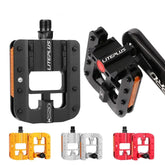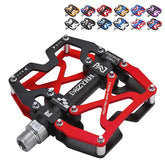-
Product Details Compact Foldable Design Easily fold the pedals with a simple press, allowing for convenient storage and space-saving—ideal for folding bikes and compact transport. Durable Aluminum Alloy Construction Crafted from a high-strength, lightweight aluminum alloy, these pedals are built to withstand wear and...
- From $48.80
- From $48.80
- Unit price
- per
-
Black Pedal
-
Silver Pedal
-
Red Pedal
-
Gold Pedal
-
Upgrade your cycling experience with these ultralight aluminium alloy pedals, designed for both road and mountain bikes. With 3 sealed bearings and a CR-Mo steel axle, these pedals offer smooth, durable performance that ensures a long-lasting, reliable ride. Whether you're cruising on roads, trails,...
- $47.99
- $47.99
- Unit price
- per
-
Y06-Black Blue Gold
-
Y06-Black Blue Red
-
Y06-Black Blue Blue
-
Y06-Blue Blue Red
- Choosing a selection results in a full page refresh.



